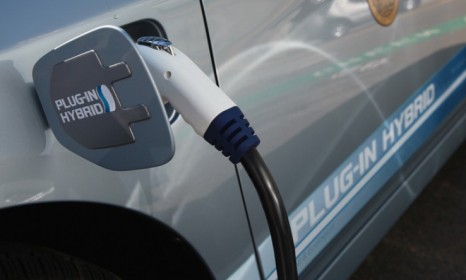Are electric cars actually bad for the environment?
New research suggests that you have to drive an electric car a long, long way for it to be greener than a gas-guzzling vehicle

A free daily email with the biggest news stories of the day – and the best features from TheWeek.com
You are now subscribed
Your newsletter sign-up was successful
Production of electric cars is speeding up, as Ford prepares to introduce its C-Max Energi next year to compete with General Motors' much-hyped Chevrolet Volt. But a new British study suggests that electric vehicles might not be as green as environmentalists think. Because of pollution from the factories that make batteries, an electric car has a bigger carbon footprint than a gas-burning vehicles until it's traveled 80,000 miles, according to the research, which was financed by the Low Carbon Vehicle Partnership. Does this mean electric cars aren't good for the planet after all?
Yes, these vehicles are bad for the environment: Electric cars just aren't "a green option," says Ed Morrissey at Hot Air. "Not only do electric vehicles produce just as much carbon in their overall cycle as internal-combustion engines, the need to replace the batteries actually makes them less green than current technology." If we want a cleaner way to get around, "the answer is natural gas, not electric vehicles."
"Electric cars are not so green after all?"
The Week
Escape your echo chamber. Get the facts behind the news, plus analysis from multiple perspectives.

Sign up for The Week's Free Newsletters
From our morning news briefing to a weekly Good News Newsletter, get the best of The Week delivered directly to your inbox.
From our morning news briefing to a weekly Good News Newsletter, get the best of The Week delivered directly to your inbox.
Electric cars aren't perfect, but they're our best bet: It's true that electric cars create more carbon emissions than standard cars during production, says Aftermarket Leads. Making batteries takes a lot of energy, and EVs require several batteries, while gas-powered vehicles have just one. But, as the study shows, electric and hybrid vehicles "still have lower carbon footprints than normal cars" over the long haul, so driving them will do the Earth some good.
"Electric vehicles have lower carbon footprints than normal cars"
We must improve the production process: Manufacturers will point to the lifetime carbon reduction to silence their critics, says Auto 123, but the study is nothing for anyone to celebrate. Nearly half the pollution from an electric car over its full life comes at the factory, before the vehicle has driven a single mile. "Quite a few improvements need to be made for green vehicles to become truly green."
"Hybrid and EV production pollutes more than gas cars, but..."
A free daily email with the biggest news stories of the day – and the best features from TheWeek.com
-
 Political cartoons for February 21
Political cartoons for February 21Cartoons Saturday’s political cartoons include consequences, secrets, and more
-
 Crisis in Cuba: a ‘golden opportunity’ for Washington?
Crisis in Cuba: a ‘golden opportunity’ for Washington?Talking Point The Trump administration is applying the pressure, and with Latin America swinging to the right, Havana is becoming more ‘politically isolated’
-
 5 thoroughly redacted cartoons about Pam Bondi protecting predators
5 thoroughly redacted cartoons about Pam Bondi protecting predatorsCartoons Artists take on the real victim, types of protection, and more